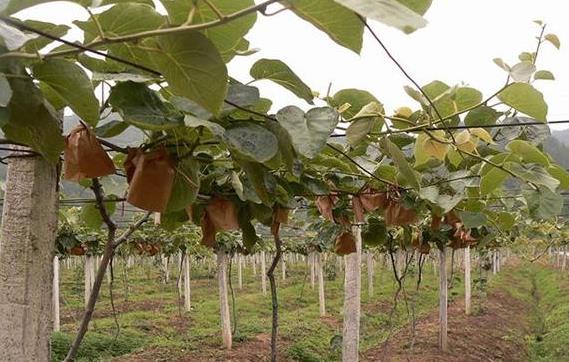Planting new varieties needs to break through the technical bottleneck
Located in Quanwang Town, Quanjiang District, Ye Qing Family Farm is like a hundred orchards, with grapes, watermelons, cantaloupe, white loquat, bayberry, blueberries, peaches, red pomelo, dragon fruit, pineapple and other fruits planted in greenhouses, with a total of more than 400 mu.
Orange seedlings are planted in one of the sheds, which are only 20 or 30 centimeters high.
"what was planted at the end of last year grew slowly." Yan Jufei, who manages the farm, said anxiously in the greenhouse on July 5.
The variety of these orange seedlings is "Aiyuan 28", and there is an image called "Red Beauty". For these "red beauties", Yan Jufei and the staff on the farm devoted a lot of painstaking efforts and placed great hopes.
In October last year, Yan Jufei went to Hangzhou to attend grape planting skills training and learned about the variety of "Red Beauty" from her peers. "it sounds good to me." So she went on a field trip to the orange orchard. I saw with my own eyes that the fruit hanging on the tree was big and beautiful, tasted very sweet and tender, and could be sold for 60 yuan per kilogram.
Since 2012, Yan Jufei has been growing fruits in Quzhou. She knows the quality, production and marketing of Quzhou oranges. Therefore, these characteristics of "Red Beauty" suddenly attracted her.
Yan Jufei cleared out the greenhouse where he originally planted eggplant, string beans, cucumbers and other vegetables, and bought the "Red Beauty" orange seedlings at the price of 20 yuan each, planting 30 mu.
Although it is a kind of fruit, the technical requirements of different fruits are different. Local employees do not know how to grow new varieties of oranges, and it is too expensive to hire professional technicians. "We can't afford to hire technicians with an annual salary of 140000." Yan Jufei has no choice but to keep groping.
"someone told me to put more organic fertilizer when planting, and now it seems that whether the orange seedlings grow fast or not has something to do with this." Yan Jufei said that through observation, she found that these fertilizers hurt the roots, the roots could not grow out, and the orange seedlings naturally did not grow up.
Yan Jufei is very easy to learn and asks questions everywhere. She says that as long as there is a mind to learn, there are people who are willing to teach. Moreover, Quzhou promotes the transformation and development of the citrus industry, which gives her the confidence to grow oranges and sees the business opportunities.
In the second half of this year, Yan Jufei is going to pull out more than a dozen mu of grapes of poor quality and plant "Red Beauty." "next time you have experience, you can put phosphate fertilizer when you plant it, and then slowly apply organic fertilizer when the roots grow well." When the root problem is solved, Yan Jufei is worried that he will not know which planting link and what problems will go wrong in the future. if he tries to solve the problem when there is a problem, it will be delayed.
"my husband also wants to contract the mountain to grow oranges and is talking to farmers." Yan Jufei said: the plan is still to grow a new variety, and we still have to slowly explore for ourselves what kind of variety and what technology is needed.
The big growers are consciously transforming. What about the orange farmers who grow sporadically around them? this is what Yin Shuigen, an agricultural technician in Quanwang town, is considering. During this time, he counted the area of dead orange trees in various villages. "Farmers are encouraged to make use of the orange tree land. Next, rice will be planted on the edge of the rice field, and dry land crops such as soybeans, corn and sesame seeds will be planted on the edge of the dry land."
Yin Shuigen said that in the second half of the year, orange seedlings can be replanted, but he is not sure about what varieties to plant and whether farmers are willing to plant them.
- Prev

Abandon the high salary and return home to start a business and lead the villagers to become rich together.
Abandon the high salary and return home to start a business and lead the villagers to become rich together.
- Next

He planted nearly 100 mu of blueberries in 4A scenic spot.
He planted nearly 100 mu of blueberries in 4A scenic spot.
Related
- A course of planting techniques and methods on how to grow carrots
- How to plant the latest tulips?
- Is it better to pick tea in the morning or in the afternoon? When is the best time for tea to be picked? what is the third or fifth tea?
- Launch Yuanxiao Happy combination Haocha + Tea Yuan healthy Taste
- Penghu Tourism "Fireworks 20 Parade with You"
- 2022 West Lake Happiness holds "Digital Revitalization Voucher" and draws iphone13 and laptop.
- Banqiao Fuzhou social houses are designed to change start-up combined with police elimination to create a safe and livable environment
- The convenient measure of "mechanical weeding" in Xinbei has been abused and the Agriculture Bureau has imposed heavy penalties on the illegal land consolidation.
- Changgeng University Joins Hands with Four Memory Factories to Rescue Memory Talent Shortage
- The list of Taiwan's top 100 MVP managers is listed by the Director-General of the Farmers' Association of Sanxia District.

